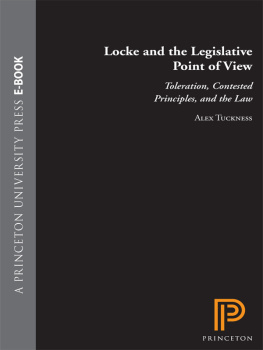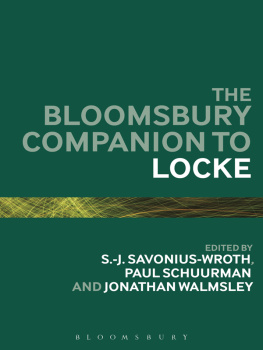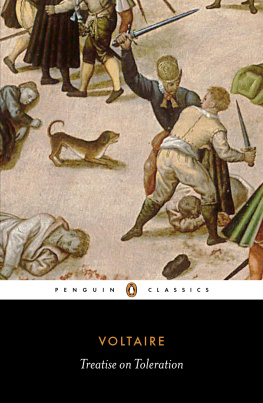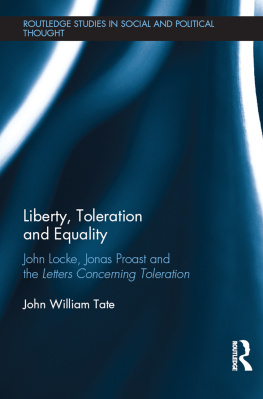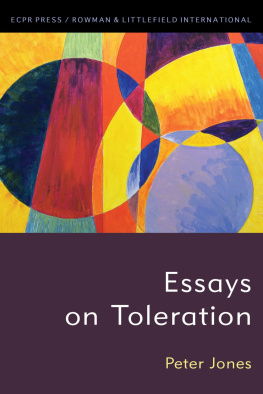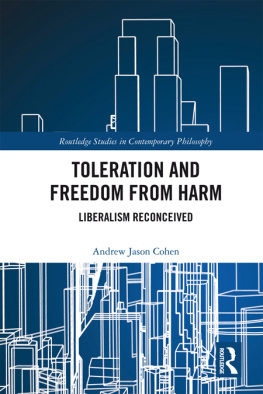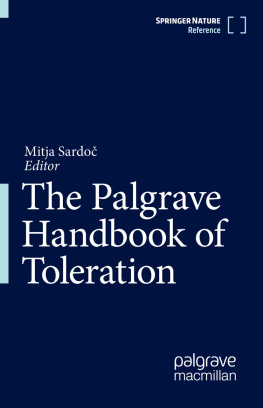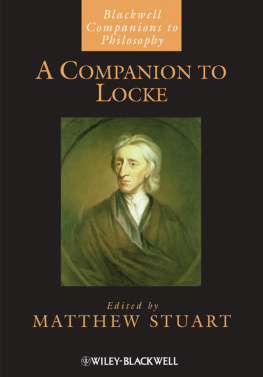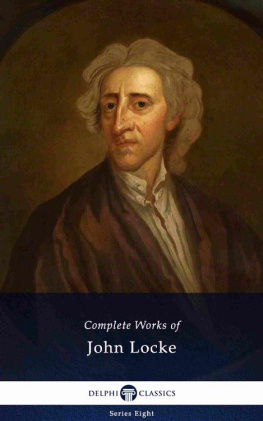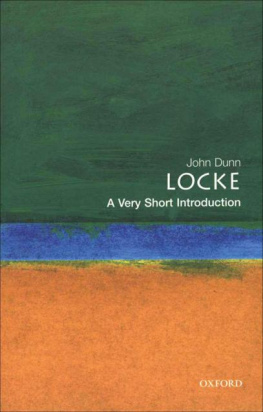Tuckness - Locke and the Legislative Point of View: Toleration, Contested Principles, and the Law
Here you can read online Tuckness - Locke and the Legislative Point of View: Toleration, Contested Principles, and the Law full text of the book (entire story) in english for free. Download pdf and epub, get meaning, cover and reviews about this ebook. City: Princeton, year: 2009, publisher: Princeton University Press, genre: Politics. Description of the work, (preface) as well as reviews are available. Best literature library LitArk.com created for fans of good reading and offers a wide selection of genres:
Romance novel
Science fiction
Adventure
Detective
Science
History
Home and family
Prose
Art
Politics
Computer
Non-fiction
Religion
Business
Children
Humor
Choose a favorite category and find really read worthwhile books. Enjoy immersion in the world of imagination, feel the emotions of the characters or learn something new for yourself, make an fascinating discovery.
Locke and the Legislative Point of View: Toleration, Contested Principles, and the Law: summary, description and annotation
We offer to read an annotation, description, summary or preface (depends on what the author of the book "Locke and the Legislative Point of View: Toleration, Contested Principles, and the Law" wrote himself). If you haven't found the necessary information about the book — write in the comments, we will try to find it.
Tuckness: author's other books
Who wrote Locke and the Legislative Point of View: Toleration, Contested Principles, and the Law? Find out the surname, the name of the author of the book and a list of all author's works by series.
Locke and the Legislative Point of View: Toleration, Contested Principles, and the Law — read online for free the complete book (whole text) full work
Below is the text of the book, divided by pages. System saving the place of the last page read, allows you to conveniently read the book "Locke and the Legislative Point of View: Toleration, Contested Principles, and the Law" online for free, without having to search again every time where you left off. Put a bookmark, and you can go to the page where you finished reading at any time.
Font size:
Interval:
Bookmark:
LOCKE AND THE LEGISLATIVE PINT OF VIEW
Locke
and the Legislative
Point of View
Toleration, Contested Principles, and the Law
A L E X T U C K N E S S

Copyright 2002 by Princeton University Press
Published by Princeton University Press, 41 William Street, Princeton, New Jersey 08540
In the United Kingdom: Princeton University Press, 3 Market Place, Woodstock, Oxfordshire OX20 1SY
All Rights Reserved
Library of Congress Cataloging-in-Publication Data
Tuckness, Alex Scott, 1971
Locke and the legislative point of view : toleration, contested
principles, and the law / Alex Tuckness.
p. cm
.
Includes bibliographical references and index.
eISBN: 978-1-40082-539-4
1. Locke, John, 16321704Contributions in political science. 2. Locke, John,
16321704Contributions in natural law. 3. Political ethics. 4. Legislative ethics.
5. Legislative power. I. Title.
JC153.L87 T83 2002
172.2dc21 2001058004
British Library Cataloging-in-Publication Data is available
This book has been composed in Sabon
Printed on acid-free paper. `
www.pup.princeton.edu
Printed in the United States of America.
10 9 8 7 6 5 4 3 2 1
For Jack and Winnie Tuckness
Do not be wise in your own eyes.
PROVERBS 3:7a (NRSV)
In everything, do to others as you would have them do to you.
MATTHEW 7:12a (NRSV)
C O N T E N T S
A C K N O W L E D G M E N T S
Many people and institutions have helped me bring this book to publication. The University of Chicagos Donnelley Exchange Scholarship allowed me to spend a year studying Locke at Cambridge University the year after I graduated. Cambridge was the best possible place for me to pursue my interest in Locke. The M. Phil. Program in Political Thought and Intellectual History provided enormous flexibility and allowed me to research and write my thesis on Lockes theory of natural law, a theme that figures prominently in the present work. Although the present work is less historical in its focus, it is still shaped by the work that I did at Cambridge. Richard Tuck served as my primary advisor that year, and John Dunn provided considerable help as well. Even after I left Cambridge both have been willing to take the time to discuss my current research and provide helpful suggestions. It was also at Cambridge that I met John Michael Parrish, another student in the same program, who has been an invaluable friend and colleague ever since. He has read and commented on several drafts of the present work.
This book is a substantially revised version of the Ph.D. dissertation I wrote at Princeton University. Both in the people who were there and in the resources that were available, Princeton was an ideal location for my project. Support from the Politics Department, the University Center for Human Values, and a University Honorific Fellowship allowed me to devote most of my time to research and to finish much more quickly than would otherwise have been possible. While I was a student there I also received a generous grant from the Harvey Fellows Program that allowed me to go to Oxford for one month to read in the Locke archives at the Bodleian Library. I owe a debt of thanks as well to the faculty and to my fellow graduate students at Princeton who made it a vibrant political theory community: Oliver Avens, Paul Bou-Habib, Aurelian Craitu, Patrick Deneen, Suzanne Dovi, Denise Dutton, Stephen Holmes, George Kateb, David Korfhage, Jacob Levy, Brenda Lyshaug, Paul Safier, Jason Scorza, Roy Tsao, and Maurizio Viroli. Posthumous thanks go to Moshe Levy, whose untimely death was a cause of great sadness for us all.
Special thanks go to the members of my dissertation committee. Robert George and Paul Sigmund gave trenchant criticisms and helpful suggestions for revisions. I owe a special debt to Jeremy Waldron, who was actively involved in advising me on the dissertation from its inception. His comments on my work, together with his own insights into Locke, law, and legislation, have left a definite imprint on my ownthought that will be apparent to those who read the present work. My greatest academic debt is to Amy Gutmann, who served as my primary dissertation advisor. Despite a demanding schedule, she was generous with her time. She read multiple drafts of each chapter, giving comments that were simultaneously critical and encouraging. The present work is much clearer, better argued, and more accessible than it would have been without her help.
The Iowa State University Council on the Humanities assisted with the revision of the present manuscript by providing summer support. The Political Science Department provided funds for a research assistant, John Chiodo. Richard Mansbach and Mary Ann Teterault both read and commented on chapter drafts. Matthew Robinson read and commented on the entire manuscript. The referees for Princeton University Press provided suggestions that have improved the manuscript. Richard Vernon provided helpful comments on multiple drafts of the manuscript. Ian Malcolm has been an exemplary editor. The responsibility for the mistakes that remain, despite all of this help, is mine.
Portions of chapter 2 are reprinted by permission from Legislation and Non-neutral Principles: A Lockean Approach, Journal of PoliticalPhilosophy 8 (2000): 263278.
In addition to these academic debts, there are two other groups to whom I owe special thanks. At every step along this journey there has been a community of faith to encourage and support me. I have also benefited from a family that is as supportive and encouraging as any I could imagine. My parents have been the most important members of both groups. I am very thankful for their love and friendship. This book is dedicated to them.
A B B R E V I A T E D R E F E R E N C E S
References to the following of Lockes primary works are given parenthetically as follows:
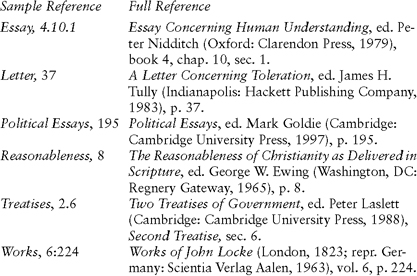
Where possible I use widely available modern editions. In particular, I use Goldies invaluable edition of Lockes minor works, Political Essays. Many of these are out of print and thus difficult to obtain. References to Lockes Essays on the Law of Nature are from Von Leydens translation reprinted in Political Essays. References to Lockes Second Letter ConcerningToleration, Third Letter Concerning Toleration, and Fourth LetterConcerning Toleration are taken from Works, vol. 6, listed above.
Introduction
Political argument in liberal democracies is characterized by both agreement and disagreement. The disagreement is obvious. Citizens profess a wide variety of conflicting beliefs about politics, morality, and religion. Competitive elections, by their structure, encourage the expression and clarification of disagreement. Among the causes of this pervasive disagreement are self-interest, human fallibility, and the complexity of difficult moral questions. The agreement in political argument is less obvious but very important. Just as we must agree on certain linguistic conventions in order to communicate at all, so also we must agree on at least some moral ideas if we are to have moral debates that are intelligible. Even persons who are moral relativists can acknowledge that within particular communities there are particular ideas and claims that are understood to have moral weight. In liberal democracies, most people will acknowledge in principle that their fellow citizens are moral agents, that they are equals in at least the sense that we should treat them according to some moral standard of reciprocity rather than as objects we can manipulate according to our desires, that the same moral rules should apply to all of us, and that we should all be able to know what those rules are. I refer to these four ideas as moral agency, moral equality, generality, and publicity. Many people give only lip service to these ideas, and our practice, both individually and collectively, often fails to respect them. Nonetheless they provide ideas that most persons recognize as carrying moral weight and provide a framework in which moral debate about politics can begin.
Next pageFont size:
Interval:
Bookmark:
Similar books «Locke and the Legislative Point of View: Toleration, Contested Principles, and the Law»
Look at similar books to Locke and the Legislative Point of View: Toleration, Contested Principles, and the Law. We have selected literature similar in name and meaning in the hope of providing readers with more options to find new, interesting, not yet read works.
Discussion, reviews of the book Locke and the Legislative Point of View: Toleration, Contested Principles, and the Law and just readers' own opinions. Leave your comments, write what you think about the work, its meaning or the main characters. Specify what exactly you liked and what you didn't like, and why you think so.

